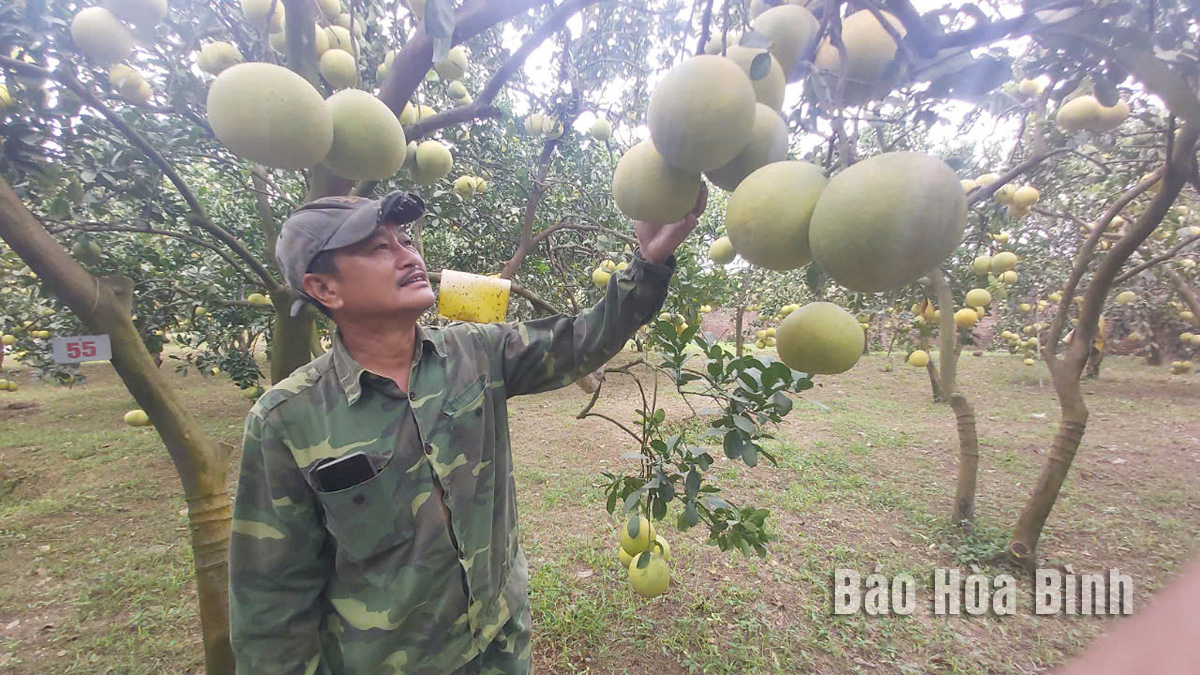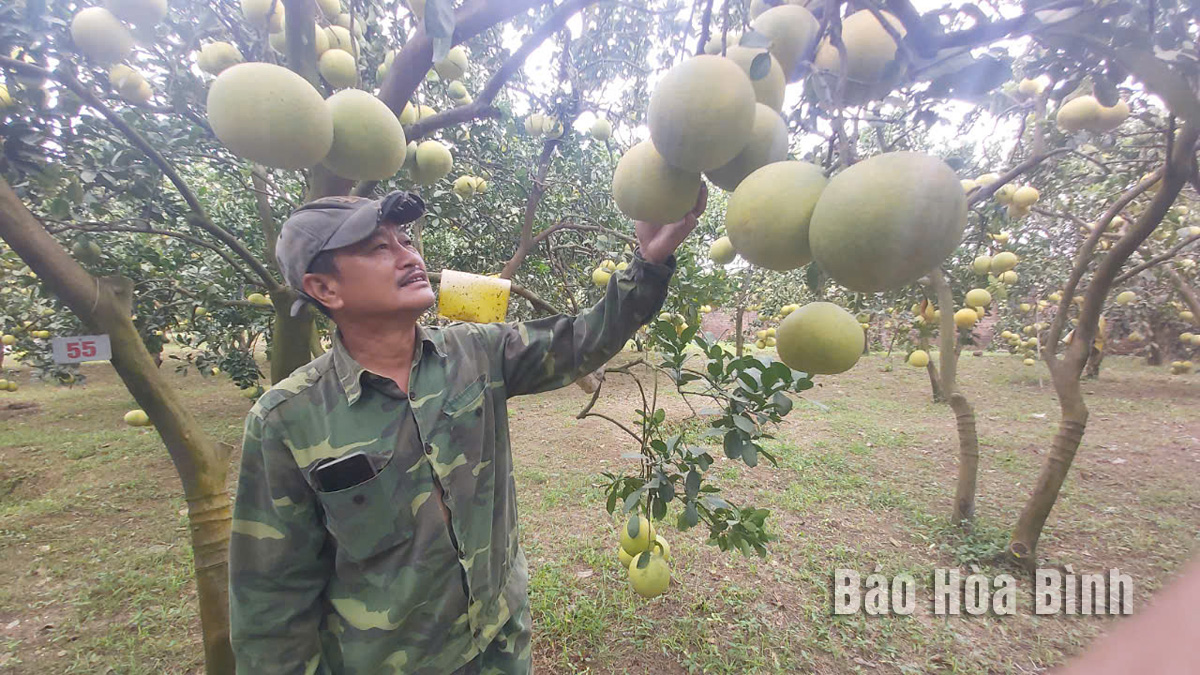
The 17th Congress of the Hoa Binh provincial Party Organisation for the 2020–2025 term set out 19 key objectives and tasks, including four targets for the agriculture sector namely an average growth rate of 4.5% for agriculture-forestry-fisheries; forest coverage of over 51.5%; access to clean water for 95% of the rural population; and 70% of communes achieving new rural standards.
Member of Dai Dong Cooperative, Ngoc Luong commune, Yen Thuy district produces Dien grapefruit according to GlobalGap standards, meeting export standards to the US and European markets.
To achieve these goals, the agriculture sector has implemented comprehensive measures. These include drafting policies to support production, encouraging investment in agriculture and rural areas, and increasing the value of key products. The sector has also successfully implemented the 2021–2025 restructuring plan across five subfields. Policies have been introduced to focus on provincial-level key products, organic agriculture, and local specialties, fostering production-to-consumption linkages and aligning with new rural development. Efforts have been made to resolve obstacles, creating value chains for agricultural products. The sector has expanded product promotion on e-commerce platforms, trade fairs, and exhibitions to boost sales.
After four years of implementing the Resolution of the 17th Congress of the provincial Party Organisation, two targets have been met, including forest coverage has surpassed 51.5%, and 95% of the rural population has access to clean water.
A highlight of the province’s agriculture has been promoting agricultural product exports. Export activities have not only focused on selling goods abroad but also on standardizing techniques for production, harvesting, and preservation, ensuring international-standard products for the domestic market.
The province has actively engaged export enterprises, identifying potential products and export markets to align product quality and standards. Efforts include issuing plantation and farming codes, GlobalGAP and ISO certifications, and food safety and phytosanitary compliance.
The development of specialised cooperatives for key products has strengthened connections between households and export enterprises. The province has also monitored changes in export market requirements, guiding stakeholders to respond effectively. Promotional efforts for flagship agricultural products have been expanded via media, trade fairs, and domestic and international trade promotion events.
Hoa Binh’s strategic location near Hanoi, diverse land and climate, and experienced agricultural workforce provide significant advantages. The Da River reservoir, known as the "Inland Ha Long Bay," offers potential for aquaculture and eco-tourism. The agriculture sector has integrated aquaculture with community-based tourism. Key initiatives include developing clean fish farming areas under VietGAP standards, conserving high-value fish species, and promoting fishery-based tourism.
The second Da River Fisheries Festival, part of the province’s 2024 Culture and Tourism Week, aims to enhance fishery development, promote eco-tourism, and enhance the branding of trademarked products such as "Hoa Binh Da River Shrimp" and "Hoa Binh Da River Fish." These efforts are positioning fisheries as a pivotal economic driver for the province.
To ensure sustainable agricultural development, the province is focusing on comprehensive planning, digital transformation, mechanization, and automation. The province aims to attract investment in agricultural product processing and logistics while enhancing the capacity of cooperatives and partnerships. Ensuring quality certification aligned with market demands and expanding trade promotion efforts will also be prioritized.
The agriculture sector remains a cornerstone of Hoa Binh’s economy, driving innovation and sustainability.
According to data from the Hoa Binh Provincial Party Committee, the industrial production index for the first six months of 2025 is estimated to have increased by 20% compared to the same period last year. This marks the highest year-on-year growth rate for this period since 2020.
In the first six months of 2025, Hoa Binh province’s export turnover was estimated at 1.145 billion USD, marking an 18.11% increase compared to the same period in 2024. Import turnover was estimated at $ 804 million, a 17.15% increase, which helped the province maintain a positive trade balance.
The lives of the ethnic minority farmers in Tan Lac district have gradually improved thanks to the new directions in agricultural production. This is a testament to the collective strength fostered through the professional associations and groups implemented by various levels of the district’s Farmers’ Union.
With the motto the "product quality comes first,” after nearly one year of establishment and operation, Muong village’s Clean Food Agricultural and Commercial Cooperative, located in Cau Hamlet, Hung Son Commune (Kim Boi district), has launched reputable, high-quality agricultural products to the market that are well-received by consumers. The products such as Muong village’s pork sausage, salt-cured chicken, and salt-cured pork hocks have gradually carved out a place in the market and they are on the path to obtaining the OCOP certification.
In the past, the phrase "bumper harvest, rock-bottom prices" was a familiar refrain for Vietnamese farmers engaged in fragmented, small-scale agriculture. But today, a new spirit is emerging across rural areas of Hoa Binh province - one of collaboration, organisation, and collective economic models that provide a stable foundation for production.
Maintaining growing area codes and packing facility codes in accordance with regulations is a mandatory requirement for agricultural products to be eligible for export. Recently, the Department of Agriculture and Environment of Hoa Binh province has intensified technical supervision of designated farming areas and packing facilities to safeguard the "green passport" that enables its products to access international markets.



